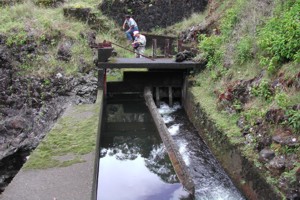According to court documents, the appeal of Judge Nishimura’s January 8 ruling is expected to cover the following issues, among others:
Whether she correctly ruled that the permits were invalid under Hawai`i Revised Statues Chapter 171 (the state’s law governing the disposition of public land) when the plaintiffs had only argued that the permits were invalid because they violated the state’s environmental review law, Chapter 343. In her ruling, Judge Nishimura specifically found that the Land Board’s December 2014 renewal of the permits did not violate Ch. 343.
Whether or not Ch. 171 and the public trust doctrine authorizes the Land Board to put revocable permits into holdover status to maintain the status quo for the public good. A&B attorneys have argued that if the Land Board has the duty to protect the public trust, it must have the authority to do it, whether or not it’s codified in statute. Ch. 171 only seems to allow for public lands and waters to be disposed of via a lease, issued directly or at public auction, or a month-to-month revocable permit that may be renewed annually.
In cases where a lease has expired, Ch. 171 gives the Land Board the authority to allow the lessee to continue to hold the land for up to one year or, in cases where crops had been planted before the lease’s expiration, until those original crops have been harvested. If, after the holdover period expires, the Land Board hasn’t decided to issue a new lease, the board is also authorized to issue a temporary permit to the lessee.
Whether any claims regarding the holdover status were time-barred. A&B’s attorneys have argued that the plaintiffs had the chance several years ago to litigate the issue of whether the Land Board can grant a holdover of the status quo, but chose not to. In 2007, the Land Board issued an order in a contested case hearing basically dismissing the NHLC’s arguments that the board could not authorize a holdover beyond one year to continue the diversions.
“The validity of the revocable permits and the holdover decision under Chapter 343 are claims that were alleged in this action and plaintiffs have conceded that those claims are time-barred,” they wrote.
Whether collateral estoppel (a common law doctrine that prevents a person from re-litigating an issue) precluded any challenges to the holdover status of the revocable permits. A&B’s attorneys argue that the Land Board’s 2007 order affirmed its hearing officer’s denial of Na Moku Aupuni o Ko`olau Hui’s and Maui Tomorrow’s motions challenging the validity of the board’s 2002 decision to grant A&B/EMI a holdover and note that the order also stated that “the holdover decision was procedurally essential to the board’s proper discharge of its public trust responsibilities.”
“This order was never appealed and is entitled to preclusive effect on the legality of the holdover decision,” A&B’s attorneys state in a court filing.
— Teresa Dawson


Leave a Reply